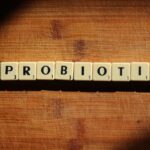We are undertaking a thorough exploration of the realm of fermented foods and the information you need to be familiar with regarding probiotics in order to begin utilizing the advantages of these microscopic organisms as soon as possible!
Probiotic supplements have the ability to boost your digestion, heart, immune system, and mental wellbeing, as well as enhance your metabolism and complexion. It almost sounds too good to be true, right? Fortunately for us, there’s enough research to prove it.
Incorporating probiotics into your life can be an exceptional way to increase your health and well-being. Prior to taking any action, it is essential to be aware of who is involved, the objectives, where and when it is taking place, and the reasons for undertaking the task.
Should I be taking a probiotic? How do I know if it’s working? Is there ever an indication for not taking probiotics? Here we’ll discuss it all!
WHAT ARE PROBIOTICS?
The International Scientific Association for Probiotics and Prebiotics classifies probiotics as existing living microorganisms which, when consumed in sufficient quantities, provide a health advantage to the recipient. Now let’s discuss what that means.
We humans are the ones who take or consume probiotics as the hosts.
We consume bacteria that is still alive, referred to as microorganisms. This could be either a food product or a dietary supplement. When you think of bacteria, you might usually assume it is something bad. However, here we are referring to the beneficial kind.
These beneficial microorganisms, also known as probiotics, have a positive impact within the large intestine. For them to be beneficial to our wellbeing, they must first survive the digestive process in the stomach. Afterwards, it goes through the small intestine before arriving at its destination.
We should also guarantee that we are consuming enough of the probiotic. It is essential to investigate each type in correspondence to its possible potency.
Probiotics, Prebiotics, and Synbiotics
When looking into probiotics, it’s important to be aware of prebiotics and synbiotics in addition.
Prebiotics essentially provide food for the beneficial bacteria that live in one’s digestive tract. The non-edible components of food are responsible for aiding the expansion and prosperity of helpful microbes (3). An illustration of prebiotics is inulin, FOS, GOS, beta-glucan, oligofructose, as well as XOS. They can be located in fiber-filled fruits and veggies like asparagus, bananas, oats, onions, apples and plenty more.
Synbiotics, such as Daily Synbiotic from Seed, are formulations containing a combination of both probiotics as well as prebiotics combined in a single product (5).
How To Interpret Probiotic Names
Before delving into the details, let’s get clear on what each part of probiotics means. Every probiotic is comprised of three sections; genus, species and strain are the main components.
An example of this is the probiotic Lactobacillus plantarum SD-LPLDL-UK. This probiotic contains the genus Lactobacillus, species plantarum, and strain SD-LPLDL-UK.
Types of Probiotics
Probiotics change your microbial composition and make it healthy. The microbiome of the intestines is essential in the metabolic process.
Some of the common probiotics species are
Lactobacillus
One of the most frequent and prevalent probiotic bacteria is Lactobacillus. Bacteria can often be seen in items like cheese and yogurt. Some species are also available in cheeses.
The more frequent strains of lactobacillus bacteria are Lactobacillus plantarum, Lactobacillus casei, Lactobacillus delbrueckii, Lactobacillus brevis, Lactobacillus rhamnosus and Lactobacillus acidophilus.
Bifidobacterium
Bifidobacterium species are commonly used in supplements. Bifidobacteria restrict the expansion of dangerous bacteria in the guts, and convert lactose into edible substances that the body can digest.
Some of the frequent types of Bifidobacterium are B. infantis, B. animalis, B. bifidum, B. longum, and B. breve.
Saccharomyces boulardii
Saccharomyces boulardii is a type of yeast that was firstly discovered in the skin of lychee and mango fruit. It is comparable to Saccharomyces cerevisiae, however, what sets it apart are its non-harmful and therapeutic characteristics.
The evidence is clear that probiotic agents have successful results in treating a variety of stomach-related complications and enhancing overall immunity.
Saccharomyces boulardii is usually known as both brewer’s yeast and baker’s yeast. It is commonly used to treat diarrhoea.
Saccharomyces boulardii is a medication that has been shown to be effective in treating a range of digestive disorders. There is proof that it can remedy diarrhoea induced by Clostridium difficile.
This intestinal disorder in premature babies, called necrotizing enterocolitis, can be handled by taking a specific probiotic organism.
S. boulardii helps to increase natural immunity by setting off and enabling the complement cells. This assists in the relocation of monocytes and granulocytes to the location of the infection.
Adaptive immunity boosts the immunity of the mucous membranes and increases the Immunoglobulin A amounts. This also activates the T cells and prevents T cell activation caused by dendritic cells.
This brings down the amount of pro-inflammatory cytokines like interleukin-8, interleukin-6, interleukin-1β, tumour necrosis factor-alpha (TNF-α) and interferon-gamma (INF-γ).
How do probiotics work?
A variety of advantages to health can be obtained by taking probiotics, ranging from improving your digestive system to reinforcing your immune system.
Probiotics are mainly involved with your digestive system. Eating aids in the breakdown of food and guards against the infiltration of harmful bacteria.
They battle against harmful bacteria and boost the immune system.
Probiotics also assist in disintegrating food and take in essential nutrients.
Our body naturally contains probiotics and there is no need to ingest them in any form. To stay healthy, it is important to eat nutritious meals in order to provide sustenance to the beneficial bacteria inside your body.
One can achieve this goal by eating nutritious and well-rounded meals.
So what’s the deal with Probiotic Supplements?
There are several signs that suggest taking probiotic supplements. This encompasses advantages for digestion, the complexion, and even cardiovascular health. Researchers have been exploring the possibility of using probiotics to stop and deal with ailments!
What Probiotics Should I Take?
When thinking about a probiotic, there are numerous factors to take into account. When deciding to supplement with probiotics, it is important to evaluate the intention, the bacterial strains within, the dosage, the regularity and any medical issues that could be at play. It is advised to collaborate with your Registered Dietitian or doctor to figure out the most helpful way to go about this process. They can evaluate your objectives in relation to your wellness and provide you with guidance.
We urge a lot of our customers to take Seed’s Daily Synbiotic (containing both probiotics and prebiotics). Research has demonstrated that various indicators of digestive wellness, cardiac wellness, and dermatological health are enhanced by 23 strain-specific human clinical experiments, which have been reported in the Journal of Clinical Gastroenterology, Scientific Reports (Nature), and JAMA Dermatology. All of the life science journal literature available at the National Institute of Health is included in PubMed, the primary database.
They possess a legally protected process of utilizing microalgae particles to guarantee the most fragile varieties are able to traverse digestion and reach the colon. Moreover, the probiotics present in Seed are exclusive and cannot be found in yogurt, aged foods, or “probiotic” drinks. Plus, they’re free from the 12 classes of allergens.
I have had a positive experience utilizing Seed probiotics for the past twelve months! Furthermore, Nutrition Stripped Wellness has incorporated them into their standard strategies for their patrons. We collaborate with companies that we admire and endorse. I’m sure you’d appreciate the merchandise from Seed too!
Health benefits of taking probiotics
Help balance the friendly bacteria in your digestive system
There are many factors that affect gut flora. One major factor is the food we consume. They either improve the bacteria in the digestive tract or alter the microorganisms in the intestine.
Eating in moderation or choosing certain foods is not necessary to keep the beneficial organisms in your digestive tract in balance.
Eating probiotics that are good for your health can help cultivate a variety of different microbes in your body which can help improve both your digestive and immune systems.
The presence of beneficial microbes is beneficial to health and helps to maintain a proper equilibrium between beneficial bacteria and the suppression of harmful microorganisms.
Certain forms of Escherichia coli as well as Salmonella species are known to be pathogenic bacteria.
Can help prevent and treat diarrhea
It has been demonstrated that probiotics can help treat diarrhea and lessen its harshness. Diarrhea can be caused by several factors, including an abnormal combination of bacterial organisms in the intestines, the use of antibiotics, and foods contaminated with infectious agents.
Research has proven that probiotics can reduce antibiotic-associated conditions. Probiotics could be used to address various types of diarrhea, not just diarrhea caused by antibiotics.
It is possible to use probiotic strains including Lactobacillus rhamnosus, Lactobacillus casei, and Saccharomyces boulardii to treat traveler’s diarrhea.
Supplements improve some mental health conditions
Probiotics can directly or indirectly improve your mental health. Taking probiotics aids in creating a feeling of wellness and contentment regarding one’s digestion.
They can also keep one’s weight in check, and if one is overweight, they can help to shed pounds. Exercising regularly can give you a sense of self-esteem and pride.
Investigations into both humans and animals showed that taking probiotic supplements can positively affect one’s mental wellbeing.
Fifteen individuals suffering from depression were administered both Bifidobacterium and Lactobacillus strains over the course of one month. It was demonstrated that it enhanced people’s psychological wellbeing, including symptoms of anxiety and depression.
Strains Can Help Keep Your Heart Healthy
People know that taking probiotics can be beneficial for digestive health and for balancing the immune system. They were unaware that probiotics could also regulate cholesterol levels and ensure proper cardiovascular health.
Beneficial bacteria such as Lactobacillus plantarum CECT 7527, Lactobacillus plantarum CECT 7528, Lactobacillus plantarum CECT 7529 and Lactobacillus reuteri NCIMB 30242 can help maintain normal cholesterol levels.
Probiotics attach to the cholesterol present in the gut and prevent it from being taken in. They create some acids and bile, which helps the body break down and use the fat. The bile is disintegrated and prevented from being brought back into the digestive system.
A survey involving 127 individuals with elevated cholesterol levels was carried out. The probiotic Lactobacillus reuteri was given to them for a duration of nine weeks.
It was discovered that when the probiotic bacteria were administered, it caused a 9% drop in the overall cholesterol rate and a 12% diminishment in the LDL level.
May Reduce the Severity of Certain Allergies and Eczema
Inflammation is the result of an immune reaction. When a pathogen gets into the body, it triggers the immune system to combat the invading pathogen. The other reason for inflammation is C-reactive protein.
Probiotics can minimize inflammation and the signs of eczema. Babies given probiotic-enriched formula experienced a decrease in eczema symptoms.
Bacteria with probiotic properties can also relieve inflammation in people with a reactivity to dairy.
Can Help Reduce Symptoms of Certain Digestive Disorders
It is widely accepted that probiotics are beneficial for the health of the gastrointestinal system and can help to reduce the signs and symptoms of digestive issues. They treat inflammatory bowel disease and irritable bowel syndrome.
Strains of bacteria such as Bifidobacterium and Lactobacillus have been successful in enhancing the condition of individuals suffering from ulcerative colitis.
Eating foods containing probiotics has been shown to lower the chances of necrotizing enterocolitis, a life-threatening disorder affecting premature infants.
May Help Boost Your Immune System
Probiotics help to improve your immunity by achieving equilibrium between microbes that are beneficial as well as those that are harmful. The lining of your intestine is populated by them, preventing detrimental bacteria from multiplying.
Probiotics stimulate the creation of native antibodies and enhance the effectiveness of immune components like immunoglobulin A, T lymphocytes, and natural killer cells.
Probiotic bacteria Lactobacillus crispatus was successful in cutting down on urinary tract infections among women.
May Help You Lose Weight and Belly Fat
Probiotic bacteria employ various approaches to trim down weight and abdominal fat. Probiotics in the digestive system take in the fat from the intestines and keep it from being stored in the body.
Foods that are rich in probiotics and prebiotics, such as yoghurt, curd and unripe bananas, provide nourishment that keeps you full for an extended period of time and supports the breakdown of calories.
Common Probiotic Myths
The current popularity of probiotics is unprecedented. Unfortunately, with popularity comes rumors. Studies are continually being conducted, multiple new probiotic-containing items are being produced daily, and increasing numbers of people are embracing them.
This has caused a spread of a number of misconceptions about probiotics. So let’s tackle some of the most common ones.
The More, The Better
It is often assumed that the greater the quantity of probiotics consumed, the more effective they will be. This isn’t necessarily the case.
Probiotics don’t need to stay in your gut permanently in order to be effective. Seed probiotic strains are transient microbes. This implies that they pass through your large intestine (where the bulk of your microbiome exists), and cooperate with the existing bacteria and your physical body (their host) in order to create widespread positive effects. That’s why the continuous, daily intake is important.
We are fond of Seed for their Daily Synbiotic which comprises medicinally-verified doses of both prebiotics and probiotics (24 herbs). The amount of each strain and the prebiotic component of dosage has been certified through medically tested data. When you combine it, the amount per day is enough to fill two capsules.
Take advantage of the exclusive savings of 15% off Seed, the Daily Synbiotic, when you enter the code nutrition stripped15 at checkout.
Probiotics Are Only Good For Digestion
The evidence we just reviewed indicates that this claim is not accurate. Probiotics have various health benefits outside of improved digestion!
By caring for our digestive system, other bodily functions are also being supported. Probiotics can be beneficial for many aspects of health, ranging from better skin condition to a healthier heart.



